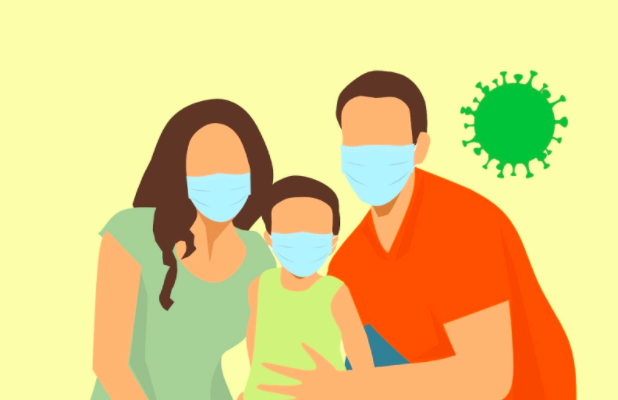Staying home from school presents a unique challenge for students with neurobehavioral and learning differences. To help prevent the spread of the new coronavirus, Maryland’s public schools are currently expected to remain closed through at least most of April.
This has caused children with special needs to spend a great deal of time away from their usual schooling routines. Parents across the country are understandably concerned about the potential for regression and have had to suddenly take on the task of intensely helping students with online work or learning packets.(1) Students with anxiety disorders, ADHD, and communication disorders may have an especially difficult time processing the events surrounding COVID-19.(2) Children with these conditions may be particularly prone to strong anxiety in response to all of these changes and the news about the pandemic itself.(3)
Keeping children calm, focused, and communicative during the pandemic can feel like a balancing act for parents. The suggestions below can help provide you with a starting point for guiding your children through these uncertain and worrisome times:
Pay Attention to Your Own Fear
As adults, we aren’t immune to feeling anxious about COVID-19. However, it’s important to focus on controlling your own fears surrounding the virus when communicating with your child. If your child sees that you’re extremely worried about the coronavirus, then it will be difficult for them to calm down, too. While staying informed and updated about the coronavirus is wise, try to keep yourself from refreshing news websites hourly. It’s best to just read the highlights a couple of times a day from a trustworthy news source (like the CDC) and then close your browser. Too much information can quickly go from informative to terrifying.
Try to Stick to a Schedule
Schedules tend to be comforting for children, especially children with neurodevelopmental and attention differences. Knowing what to expect and when can help minimize feelings of anxiety and promote a positive homeschooling environment. Students follow a schedule at school, so sticking to a schedule at home is one way to bring familiarity to the day.
Help Your Child to Maintain Healthy Habits
While it may be tempting (and understandable) to relax healthy eating, sleep, and screen time habits during this time, try to keep your usual limits and rules as much as possible. Encourage your child to enjoy fruits and vegetables, get plenty of sleep, and take breaks from screens in favor of other activities from time to time. As long as it’s possible to remain safely distanced from others, go ahead and take a stroll or enjoy time in the backyard. Being outside can have a positive impact on everyone’s mental health.
Have Open and Calm Conversation
Let your child ask you questions about the coronavirus. Together, you can visit trustworthy websites to accurately answer concerns. However, remember that too much news can make anxiety worse.(4) When using the Internet with your children, try to help them understand the difference between rumors and facts. There is a lot of misinformation about COVID-19 on the Internet, especially on social media, and that can be scary for children.
Recently, Maryland social workers Arlen Grad Gaines and Meredith Englander Polsky wrote a free children’s book called I Have a Question About Coronavirus.(5) This book is available online for parents to download and includes a short picture book for children who benefit from shorter reads and visualizations.
Teach Your Child About Hand Washing and Social Distancing
To help your child feel more in control during the pandemic, make sure that he or she knows the proper way to wash hands and understands the reasons behind social distancing. You could even make a game out of singing songs for the 20 seconds of hand washing.
Take Advantage of Facetime and Related Technologies to Stay in Touch
Social distancing refers to physical distancing, not communication. Let your child know that it’s a great idea to call Grandma on Facetime or Zoom classmates. Safely staying in touch with other loved ones will help your child to feel connected during such a challenging time.
NeuroBehavioral Associates: Serving Your Family
Conveniently located right across from the Columbia Mall, Neurobehavioral Associates serves children, teens, and adults with a variety of neurodevelopmental, learning, cognitive, and attention differences.
We provide comprehensive neuropsychological assessments and consultations to effectively guide interventions and supports. Additionally, we also offer forensic neuropsychology services, as well as Neuropsychologically Informed Strategic Therapy.
At NeuroBehavioral Associates, we continue to follow the strict disinfecting guidelines found in OSHA’s Guidance on Preparing Workplaces for COVID 19. We follow all recommendations from the Centers for Disease Control (CDC) and the World Health Organization (WHO). We are a small office and we currently remain open to serve you and your family. Contact us today to schedule an assessment or other service.
Resources:
- Keierleber, M. (2020, March 17). ‘Absolutely, I’m Worried’: For Children With Special Needs, Unprecedented Coronavirus School Closures Bring Confusion, Uncertainty. Retrieved March 31, 2020, from https://www.the74million.org/article/absolutely-im-worried-for-children-with-special-needs-unprecedented-coronavirus-school-closures-bring-confusion-uncertainty/
- Team, U. (2020, March 18). How to Talk About Coronavirus With Kids. Retrieved March 31, 2020, from https://www.understood.org/en/school-learning/how-to-talk-about-coronavirus-with-kids
- Zylowska, L., White, E., ADHD Editorial Board, & ADHD Editorial Board. (2020, March 18). How to Explain Coronavirus COVID-19 to a Child with Anxiety & ADHD. Retrieved March 31, 2020, from https://www.additudemag.com/explain-coronavirus-covid-19-anxiety-adhd-child/
- Talking to Children About Coronavirus. (n.d.). Retrieved March 31, 2020, from https://www.umms.org/coronavirus/what-to-know/health-wellness/talking-to-children
- Byck, D. (2020, March 24). These Maryland Social Workers Wrote A Children’s Book To Answer Coronavirus Questions. Retrieved March 31, 2020, from https://www.washingtonian.com/2020/03/23/these-maryland-social-workers-wrote-a-childrens-book-to-answer-coronavirus-questions/

